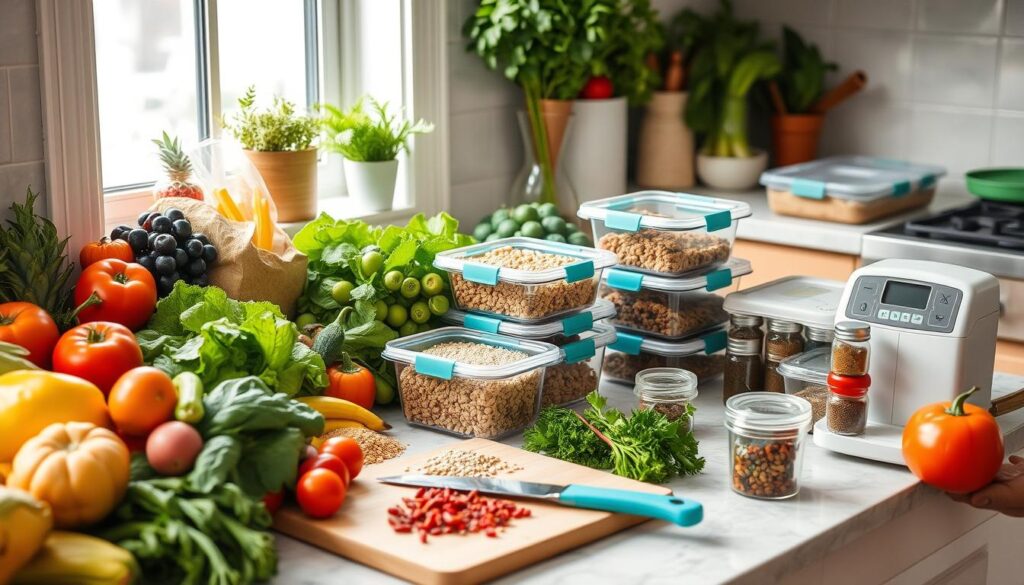Welcome to the ultimate beginner’s guide to meal preparation! It can seem daunting at first, but it’s your key to kitchen success. Whether you’re a busy pro, a student, or just want to cook faster, we’ve got you covered. This guide will show you the basics of easy meal prep.
Meal prep is more than just cooking ahead. It’s a smart way to eat well, save time, and lower stress. With the right skills, you can make tasty, healthy meals that fit your life. Our guide will teach you everything you need to know about meal prep.
Key Takeaways
- Understand the core principles of effective meal preparation
- Learn time-saving strategies for cooking and storing meals
- Discover how meal prep can save money and reduce daily stress
- Gain insights into nutrition and portion control
- Develop practical kitchen skills for efficient cooking
Understanding the Basics of Meal Prepping
Meal prep is more than a kitchen trend. It’s a smart way to eat well, save time, and manage your health. By setting aside a few hours each week, you can change how you see food and your daily life.
Learning to prep meals can greatly benefit your health and lifestyle. Let’s look at the key points that make meal prep a valuable skill.
Benefits of Regular Meal Preparation
- Saves a lot of time on busy weekdays
- Reduces stress about what to eat
- Keeps your diet consistent
- Helps avoid buying unhealthy food on impulse
- Supports your weight loss goals
Common Misconceptions About Meal Prep
Many people stay away from meal prep because of myths. Let’s clear up some common misconceptions:
- Myth: Meal prepping takes a lot of time
Reality: With good planning, you can make several meals in 2-3 hours
- Myth: Prepped meals are boring
Reality: With the right seasonings and variety, meals stay interesting
Essential Kitchen Tools
| Tool Category | Recommended Items |
|---|---|
| Storage | Glass containers, meal prep containers, zip-lock bags |
| Preparation | Sharp knives, cutting boards, measuring cups |
| Cooking | Large baking sheets, slow cooker, instant pot |
“Meal prep is not about perfection, it’s about progress and making healthier choices easier.” – Nutrition Expert
Grasping these meal prep basics can change how you cook and eat. Begin with small steps, stay consistent, and see how meal prep improves your daily life.
Smart Shopping: Creating Your Meal Prep Grocery List
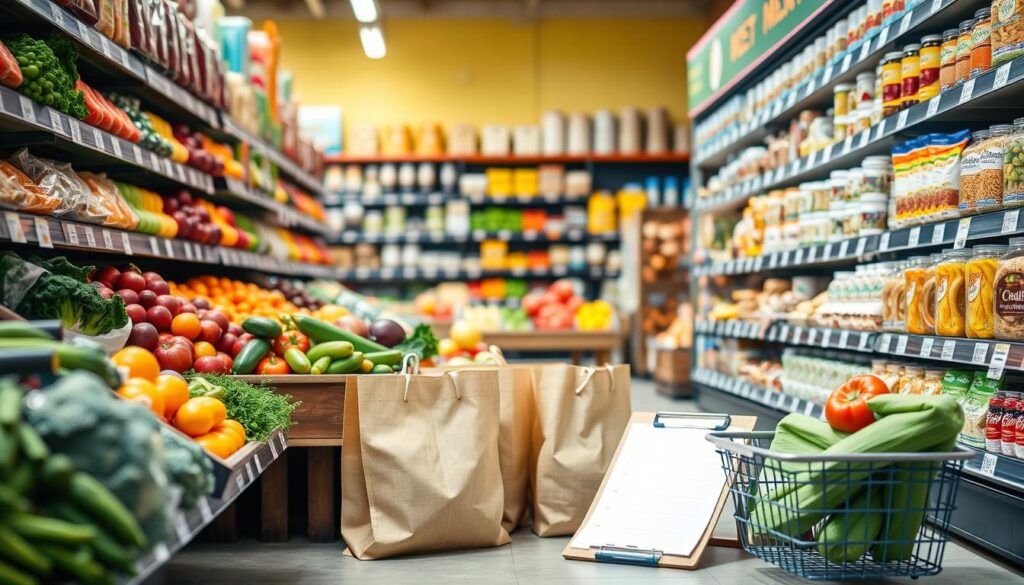
Effective meal prep shopping starts with a strategic grocery list. This list saves money and time. Planning your grocery list is key for successful meal preparation.
“A well-planned grocery list is the foundation of efficient meal prepping and budget-conscious cooking.”
When creating your meal prep grocery list, consider these key strategies:
- Focus on versatile ingredients that work across multiple recipes
- Prioritize bulk buying for staple items
- Choose proteins with longer shelf life
- Select seasonal produce for better prices
Bulk buying can significantly reduce your grocery expenses. Purchasing ingredients in larger quantities allows you to maximize savings and minimize frequent shopping trips.
| Ingredient Category | Budget-Friendly Options | Bulk Buying Potential |
|---|---|---|
| Proteins | Chicken thighs, eggs, canned tuna | High |
| Grains | Rice, quinoa, oats | Very High |
| Vegetables | Frozen mixed vegetables, carrots, onions | Medium |
Smart meal prep shopping requires planning and understanding which ingredients provide the best value. By strategically selecting budget-friendly ingredients and embracing bulk buying, you’ll streamline your grocery list and optimize your meal preparation process.
Kitchen Setup and Food Storage Essentials
Turning your kitchen into a meal prep hub needs careful planning and the right tools. Good kitchen organization and smart storage make meal prep easier and more fun.
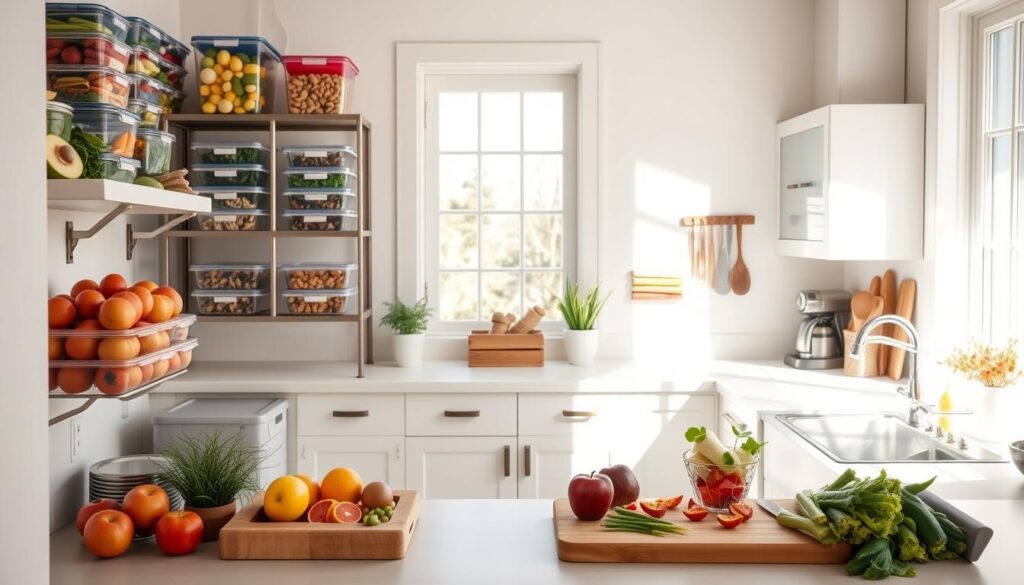
Starting with the basics of kitchen setup and food storage is key. The right steps save time, cut down stress, and keep your meals fresh and safe.
Container Types and Their Uses
Choosing the right meal prep containers is vital for food quality and safety. Each type has its own role:
- Glass containers: Great for reheating and long-term storage
- Plastic containers: Light, affordable, and easy to find
- Stainless steel containers: Strong, leak-proof, and durable
- Silicone containers: Flexible, easy to clean, and versatile
Organizing Your Prep Space
Organizing your kitchen well is essential for efficient meal prep. Set up areas for:
- Prep area with cutting boards
- Cooking stations
- Cooling and storage spaces
- Clean-up zone
“A well-organized kitchen is the foundation of successful meal preparation.” – Professional Chef
Food Safety Guidelines
Following strict food safety rules keeps you healthy and meal quality high. Important steps include:
- Use clean containers
- Cool foods before storing
- Label containers with dates
- Store at the right temperatures
Investing in quality meal prep containers and keeping your kitchen organized streamlines food prep. You’ll enjoy fresh, safe meals all week.
Beginner's Guide to Easy Meal Prep: Start Here!
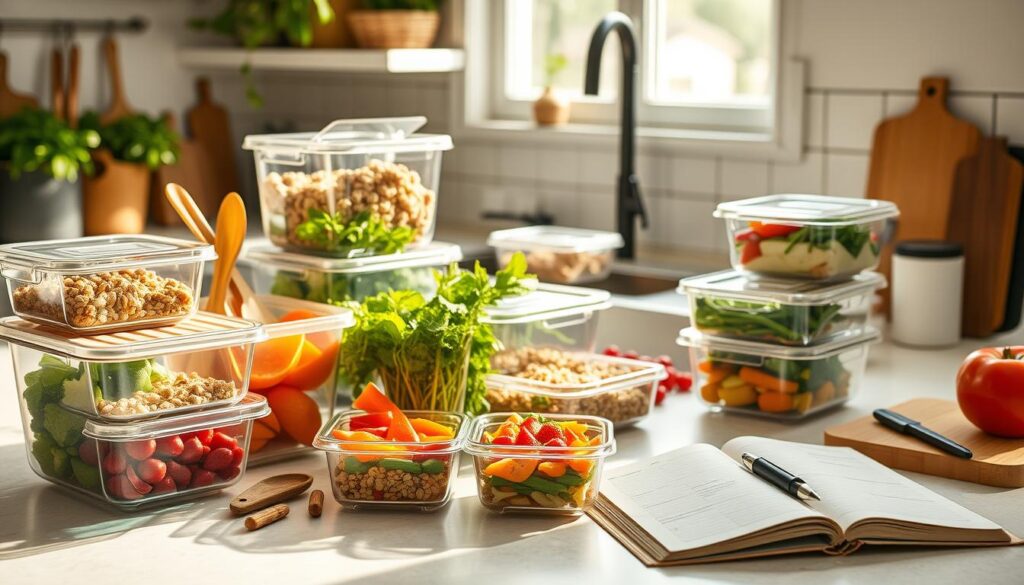
Starting meal prep can feel daunting, but it’s easier than you think. With a simple guide, you’ll master meal prep in no time. Begin with simple steps and boost your kitchen skills.
“Meal prep is not about being perfect, it’s about making your life easier and healthier.” – Nutrition Expert
Here’s how to break down meal prep into simple steps:
- Start with 2-3 easy recipes
- Plan your meals for the week
- Make a detailed grocery list
- Set aside 2-3 hours for prep
- Buy good quality containers
Good meal prep starts with planning. Here’s a quick guide to protein, grain, and veggie combos:
| Protein | Grain | Vegetable |
|---|---|---|
| Grilled Chicken | Quinoa | Roasted Broccoli |
| Baked Salmon | Brown Rice | Sautéed Spinach |
| Tofu | Cauliflower Rice | Steamed Carrots |
Pro tip: Pick simple, versatile recipes that you won’t get tired of. Cooking proteins and grains in bulk makes prep easier during the week.
- Invest in quality food storage containers
- Label everything with prep date
- Keep your prep space clean and organized
Meal prep gets better with practice. Don’t worry if it’s not perfect at first. Each week, you’ll get better and more confident in your meal prep skills.
Time-Saving Techniques for Efficient Meal Preparation
Learning to prep meals efficiently means planning well and using smart kitchen tricks. It can save you hours each week. Plus, you’ll always have tasty, healthy meals ready to go.
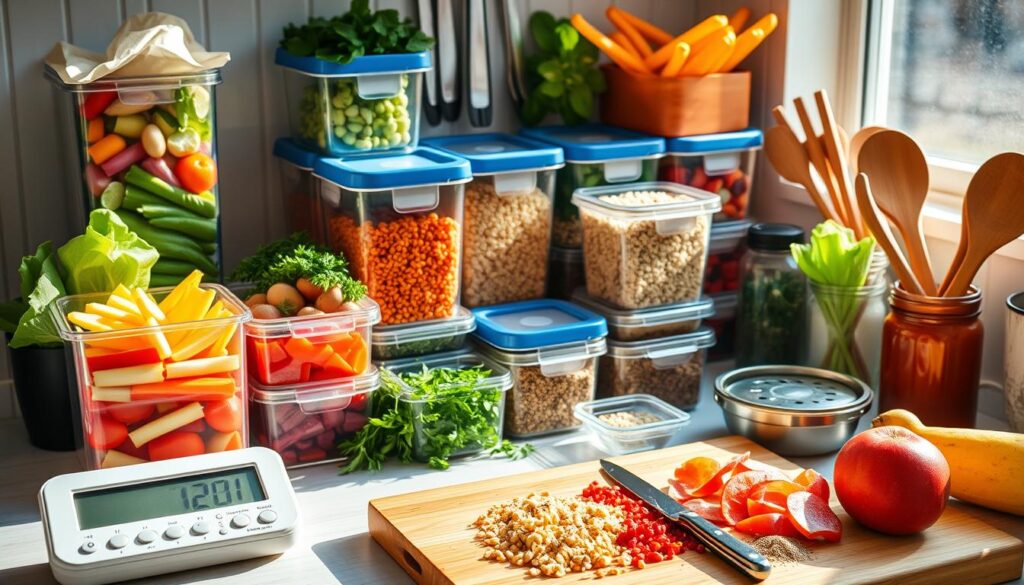
Batch Cooking Strategies
Batch cooking is a big help for those with busy lives. It lets you make many meals with just a little effort. Here are some top tips:
- Cook proteins in bulk (chicken, ground turkey, beans)
- Roast multiple vegetable varieties simultaneously
- Prepare grains like quinoa and rice in large batches
“Work smarter, not harder in the kitchen” – Meal Planning Pro
Multi-tasking in the Kitchen
Efficient meal prep means doing more than one thing at once. While something bakes in the oven, you can chop veggies or make marinades. Get tools that help you cook more than one thing at once.
Weekly Planning Tips
Good meal planning needs a plan. Make a weekly menu that’s varied but easy. Here are some tips:
- Schedule a dedicated prep day (usually Sunday)
- Plan meals that use the same ingredients
- Choose recipes that can be easily changed up
Using these batch cooking and meal planning tips will make your kitchen work better. You’ll save time all week long.
Best Foods for Meal Prepping
Choosing the right ingredients for meal prep is key. Opting for versatile and long-lasting foods makes meal planning easy. It turns a tough task into a breeze.
Start with high-quality protein sources for your meal prep. Lean proteins like chicken, tofu, and hard-boiled eggs are great. They keep your meals nutritious and tasty.
- Protein Sources:
- Grilled chicken breast
- Baked tofu
- Canned fish
- Eggs
Long-lasting produce is essential for meal prep success. Root veggies, hearty greens, and some fruits stay fresh for days. They keep their nutritional value.
| Vegetable Category | Best Meal Prep Options | Storage Duration |
|---|---|---|
| Root Vegetables | Carrots, Sweet Potatoes, Beets | 5-7 days |
| Hearty Greens | Kale, Collard Greens, Swiss Chard | 4-6 days |
| Sturdy Fruits | Apples, Oranges, Grapefruits | 7-10 days |
“The key to successful meal prep is choosing ingredients that remain delicious and nutritious days after preparation.”
Grains and legumes are great for meal prep. They include quinoa, brown rice, and beans. These foods last long and are full of nutrients.
- Recommended Grains and Legumes:
- Quinoa
- Brown rice
- Black beans
- Lentils
By picking ingredients that last and are nutritious, you’ll make meal prep easy. You’ll have healthy, tasty meals all week.
Portion Control and Nutritional Balance
Creating balanced meals is key to successful meal prepping. Mastering portion control ensures a healthy diet and the right nutrients. Knowing how to distribute macronutrients can change your meal prep game.
Macronutrient Distribution
Balanced meals need careful attention to macronutrients. The best mix is:
- Proteins: 20-30% of total calories
- Carbohydrates: 40-50% of total calories
- Healthy Fats: 20-30% of total calories
Measuring and Portioning Guidelines
Accurate portion control prevents overeating and meets nutritional goals. Here are some tips:
- Invest in a digital kitchen scale
- Use measuring cups for consistent servings
- Learn visual portion size comparisons
| Food Group | Recommended Portion Size | Measurement Tool |
|---|---|---|
| Proteins | 3-4 oz | Palm-sized portion |
| Grains | 1/2 cup | Cupped hand |
| Vegetables | 1 cup raw | Fist-sized portion |
Storage Duration Tips
Proper meal prep storage is key for food quality and safety. Most meals can be refrigerated for 3-5 days. Always use airtight containers and label with preparation dates.
“Meal prepping is about creating nutritious, portioned meals that support your health goals.” – Nutrition Expert
By using these portion control tips, you’ll make balanced meals that meet your nutritional needs. Meal prep will become more efficient and fun.
Common Meal Prep Mistakes to Avoid
Mastering meal prep means avoiding key errors that affect food quality and safety. Knowing these mistakes helps home cooks make better meal prep plans.
Choosing the right ingredients is key to good meal prep. Beginners often make big mistakes that harm their prep experience:
- Choosing ingredients with short shelf lives
- Neglecting proper food safety guidelines
- Overprepping and creating excessive waste
- Ignoring proper storage techniques
“Smart meal prep is about quality, not quantity.” – Professional Nutritionist
Food safety errors can make your meal prep unhealthy. Always check ingredient freshness, use the right storage containers, and know refrigeration times.
Overprepping is another big mistake. Making too much food wastes resources and can spoil. To avoid this, plan your portions well, learn about preserving ingredients, and change your meal plans weekly. Also, invest in good storage solutions.
Pro tip: Start small, learn from each prep session, and gradually improve your meal preparation skills.
Conclusion
Starting a meal prep journey changes more than just how you cook. It brings many benefits that go beyond just making food. You’ll manage your time better and eat healthier as you get better at planning.
Success in meal prep comes from doing it regularly and getting a little better each time. Begin with small steps, try new things, and find what fits your life. Meal prep gets easier with practice, making healthy meals a breeze.
Meal prep is a way to invest in your health. Spending a few hours each week on food prep can lower stress, save money, and help you control what you eat. The skills you learn help you reach your health goals in a lasting way.
Approach meal prep with patience and excitement. It’s about making progress, not being perfect. As you get better, you’ll have more efficient routines, enjoy healthier food, and have more time for other things.
FAQ
What exactly is meal prepping?
Meal prepping means cooking meals ahead of time. It’s great for saving time and eating healthier. You cook and portion meals for the week, making it easy to stay on track during busy days.
How long can prepared meals typically be stored?
You can store most meals in the fridge for 3-5 days. Proteins and grains last up to 4 days. Vegetables and salads might stay fresh for 3-4 days. Always check for spoilage before eating.
Do I need special equipment to start meal prepping?
You don’t need a lot of equipment to start. Basic tools include containers, cutting boards, knives, and measuring cups. Good storage containers make meal prep easier.
How can I prevent my meals from becoming boring?
Keep meals exciting by trying new spices and techniques. Mix proteins, grains, and veggies. Prepare base ingredients for different meals.
Is meal prepping expensive?
Meal prepping can save money. It reduces impulse buys and restaurant meals. Plan meals and buy ingredients in bulk to cut costs.
Can I meal prep if I have dietary restrictions?
Yes! Meal prepping works for all diets, like vegetarian, vegan, or gluten-free. Just plan and choose the right ingredients for your needs.
How much time does meal prepping actually take?
Meal prepping for a week takes 2-4 hours on a weekend. As you get better, you’ll prep faster. The upfront time saves you a lot during the week.
What are the best foods for meal prepping?
Great meal prep foods include:- Proteins: Chicken, turkey, hard-boiled eggs, tofu- Grains: Brown rice, quinoa, sweet potatoes- Vegetables: Roasted broccoli, carrots, Brussels sprouts- Legumes: Black beans, chickpeas- Fruits: Berries, sliced melons, apple slices
How do I keep my meal prepped food from getting soggy?
Store wet and dry ingredients separately. Use containers with compartments. Add sauces just before eating. Choose cooking methods that keep food crisp.
Is it safe to freeze meal prepped food?
Yes, many meals freeze well. Cooked meals can be frozen for 1-3 months. Use freezer-safe containers and label them. Avoid freezing watery foods or those with crispy elements.

